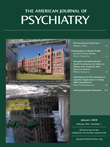Increased Error-Related Brain Activity in Pediatric Obsessive-Compulsive Disorder Before and After Treatment
Abstract
Objective: The error-related negativity is a negative deflection in the event-related potential maximal approximately 50 msec after the commission of errors. The error-related negativity is generated in the anterior cingulate cortex, and both anterior cingulate cortex hyperactivity and increased error-related brain activity have been reported in adults with obsessive-compulsive disorder (OCD). However, no study to date, to the authors’ knowledge, has examined error-related brain activity in pediatric patients with OCD, and no study has examined error-related brain activity in OCD both before and after treatment. Method: The error-related negativity was measured in 18 treatment-seeking pediatric patients with OCD and 18 age-matched comparison subjects. Of these patients, 10 returned for a second testing session after cognitive behavior therapy; 13 comparison children participated a second time after a comparable interval. Results: In the pretreatment group, the error-related negativity was reliably larger in pediatric patients with OCD in relation to comparison subjects. This difference was also evident after treatment. There was no relationship between error-related negativity and symptom severity or changes in symptom severity. Conclusions: Consistent with studies in adult patients, increased error-related brain activity is evident in pediatric patients with OCD. Furthermore, increased error-related brain activity does not appear to change as a function of symptom reduction after therapy. These results suggest that an increased error-related negativity may be a trait-like marker for psychopathology and might be a useful endophenotype.



